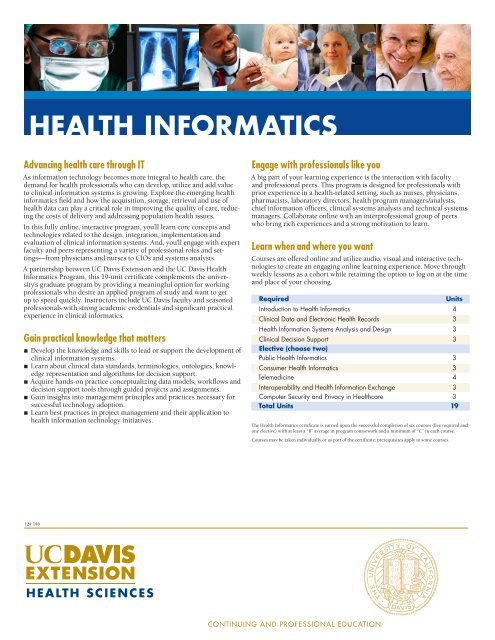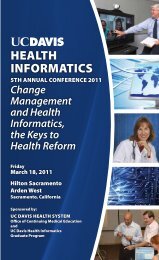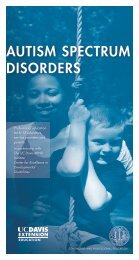Health Informatics Certificate Program Factsheet - UC Davis Extension
Health Informatics Certificate Program Factsheet - UC Davis Extension
Health Informatics Certificate Program Factsheet - UC Davis Extension
You also want an ePaper? Increase the reach of your titles
YUMPU automatically turns print PDFs into web optimized ePapers that Google loves.
HEALTH INFORMATICSAdvancing health care through ITAs information technology becomes more integral to health care, thedemand for health professionals who can develop, utilize and add valueto clinical information systems is growing. Explore the emerging healthinformatics field and how the acquisition, storage, retrieval and use ofhealth data can play a critical role in improving the quality of care, reducingthe costs of delivery and addressing population health issues.In this fully online, interactive program, you’ll learn core concepts andtechnologies related to the design, integration, implementation andevaluation of clinical information systems. And, you’ll engage with expertfaculty and peers representing a variety of professional roles and settings—fromphysicians and nurses to CIOs and systems analysts.A partnership between <strong>UC</strong> <strong>Davis</strong> <strong>Extension</strong> and the <strong>UC</strong> <strong>Davis</strong> <strong>Health</strong><strong>Informatics</strong> <strong>Program</strong>, this 19-unit certificate complements the university’sgraduate program by providing a meaningful option for workingprofessionals who desire an applied program of study and want to getup to speed quickly. Instructors include <strong>UC</strong> <strong>Davis</strong> faculty and seasonedprofessionals with strong academic credentials and significant practicalexperience in clinical informatics.Gain practical knowledge that matters■■Develop the knowledge and skills to lead or support the development ofclinical information systems.■■Learn about clinical data standards, terminologies, ontologies, knowledgerepresentation and algorithms for decision support.■■Acquire hands-on practice conceptualizing data models, workflows anddecision support tools through guided projects and assignments.■■Gain insights into management principles and practices necessary forsuccessful technology adoption.■■Learn best practices in project management and their application tohealth information technology initiatives.Engage with professionals like youA big part of your learning experience is the interaction with facultyand professional peers. This program is designed for professionals withprior experience in a health-related setting, such as nurses, physicians,pharmacists, laboratory directors, health program managers/analysts,chief information officers, clinical systems analysts and technical systemsmanagers. Collaborate online with an interprofessional group of peerswho bring rich experiences and a strong motivation to learn.Learn when and where you wantCourses are offered online and utilize audio, visual and interactive technologiesto create an engaging online learning experience. Move throughweekly lessons as a cohort while retaining the option to log on at the timeand place of your choosing.RequiredUnitsIntroduction to <strong>Health</strong> <strong>Informatics</strong> 4Clinical Data and Electronic <strong>Health</strong> Records 3<strong>Health</strong> Information Systems Analysis and Design 3Clinical Decision Support 3Elective (choose two)Public <strong>Health</strong> <strong>Informatics</strong> 3Consumer <strong>Health</strong> <strong>Informatics</strong> 3Telemedicine 4Interoperability and <strong>Health</strong> Information Exchange 3Computer Security and Privacy in <strong>Health</strong>care 3Total Units 19The <strong>Health</strong> <strong>Informatics</strong> certificate is earned upon the successful completion of six courses (five required andone elective) with at least a “B” average in program coursework and a minimum of “C” in each course.Courses may be taken individually or as part of the certificate; prerequisites apply to some courses.124 146CONTINUING AND PROFESSIONAL ED<strong>UC</strong>ATION
REQUIREDIntroduction to <strong>Health</strong> <strong>Informatics</strong><strong>Health</strong> informatics is the intersection of informationtechnology, computer science and healthcare. In this introductory course, gain broadexposure to the field of health informaticswith an emphasis on its application in variousclinical settings. Explore the array of informaticssub-specialties and the role of the healthinformaticist in bridging clinical care and informationtechnology. Learn the core conceptsand technologies, including terminologies, datastandards, development approaches/strategies,data security and privacy. Consider the policycontext of health information technology andperspectives on future directions in the field.Clinical Data and Electronic<strong>Health</strong> RecordsDevelop a comprehensive understanding ofelectronic health record systems and their potentialfor improving efficiency and enhancingthe quality of care. Learn about the componentsof an electronic health record (EHR) system,data standards and information representation,emerging and specialized terminologicalsystems, and technical issues in data integrationand interoperability. Understand clinical workflowsand how these affect system design, andgain insights into clinical decision making andinformation needs at the point of care. Othertopics include EHR implementation, commonbarriers to adoption, health informationexchanges and the role of EHRs in public health.<strong>Health</strong> Information SystemsAnalysis and DesignWith an emphasis on the role of theinformaticist, apply systems analysisand design theory to the development of healthinformation systems. Learn basicprinciples of object-oriented programmingand relational databases; the processes forassessing and modeling user requirementsand data structures; the role of data standardsin systems design; and basic data warehousingstrategies. Using a case study approach, learn toidentify system strengths and weaknesses andgain hands-on practice in data modelingapproaches to translate user requirements tosystem specifications.Clinical Decision SupportExplore the principles of evidence-basedmedicine and the role of decision support toolsin bringing informatics to the bedside. Learnabout clinical decision support systems, commondata sources and medical algorithms, andthe applications and limitations of decision supportas a supplement to clinical judgment. Gainhands-on practice with a variety of proprietaryand open source systems, and evaluate theirrelative strengths and weaknesses.ELECTIVESPublic <strong>Health</strong> <strong>Informatics</strong>Gain a comprehensive overview of informationtechnology applications in the public healthdomain, focusing on the collection, verification,exchange and utilization of data related topopulations as well as the infrastructure, functionsand tools used to generate public healthknowledge. Explore data mining techniquesand the use of geographical informationsystems in mapping public health data. Othertopics include: disease surveillance, web-basedpublic health education, policy and the future ofpublic health informatics.Consumer <strong>Health</strong> <strong>Informatics</strong>Explore how consumer health informaticspromotes consumer empowerment by makinghealth information more accessible and usable.Examine the use of health websites, blogs andsocial media tools for patient education, as wellas the emerging use of mobile applications andconsumer electronic devices for chronic diseasemanagement. Topics include current trends;common sources of information; disparities inaccess and health literacy; usability factors; ethicsand privacy. Consider the changing nature ofthe doctor-patient relationship; the coming era ofpersonalized and participatory medicine; and therole of consumer health informatics in systematizingand codifying consumers’ needs, valuesand preferences in medical information systems.TelemedicineLearn to develop and write a comprehensiveand strategic business plan for a telemedicineprogram of your choice. Discuss key clinical,legal and policy issues, including HIPAA andJCAHO rules on risk management, standards,regulations, compliance and ethics. Compareand contrast various telemedicine programs todetermine best practices for implementing andevaluating programs and learn about emergingtechnologies including cloud-based and mobilehealth environments. This course is designedfor physicians, nursing and paramedical professionals,telemedicine coordinators, hospitaladministrators and health informatics studentsand professionals who wish to attain the knowledge,understanding and practical preparationfor planning, implementing and practicingtelemedicine.Computer Security and Privacy in <strong>Health</strong>careExamine how computer security andprivacy impact electronic health informationand exchange—ranging from EHRs andtelemedicine to mobile devices and roboticsurgical instruments. Topics include: basicsecurity concepts; data sanitization andrevelation; privacy, identity and attribution;auditing and forensics; security metrics; andlegal aspects of privacy and security. All topicsare explored using inquiry methods to helpparticipants think critically when faced withdecisions that require adequate understandingof systems that interface with health care andmedical data.Interoperability and <strong>Health</strong> Information ExchangeInteroperable health information exchange(HIE) is fundamental to achieving the goals ofMeaningful Use. In this comprehensive course,gain exposure to basic and advanced principlesof interoperability as applied to HIE; learnhealth data exchange standards for health careservices and public health; explore commonarchitectures for HIE as well as business andoperational models that promote sustainability;and examine case studies of successfulimplementations from the United States andCalifornia. Also covered are the next generationof health information organizations (HIOs) andHIE services to support healthcare analytics,disease management, and the mobile ecosystem.In our hands-on lab, experience howinteroperable data exchange works usingan emerging national standard for healthinformation exchange. Learn how to create apatient record in an electronic health record(EHR) system and use simple, secure andpowerful HIE techniques tosend it to a patient’spersonal health record (PHR).BRN credit<strong>UC</strong> <strong>Davis</strong> <strong>Extension</strong> is an approved continuingeducation provider by the California Boardof Registered Nursing (Provider #00046).Thecourses in this section adhere to the Boardof Registered Nursing (BRN) standards andstudents can receive BRN credits for takingthese classes.Advance your clinicaltraining programConsider adding a clinical informatics rotationfor your residents by leveraging one or morecourses from this program.For information about options, pleasecontact a program representative todayat 530-757-8993.ADDITIONAL INFORMATIONCourse schedules, fees and enrollment information:extension.ucdavis.edu/healthinformatics<strong>Program</strong> questions? 530-757-8993Enrollment questions? (800) 752-0881 or extension@ucdavis.edu
















